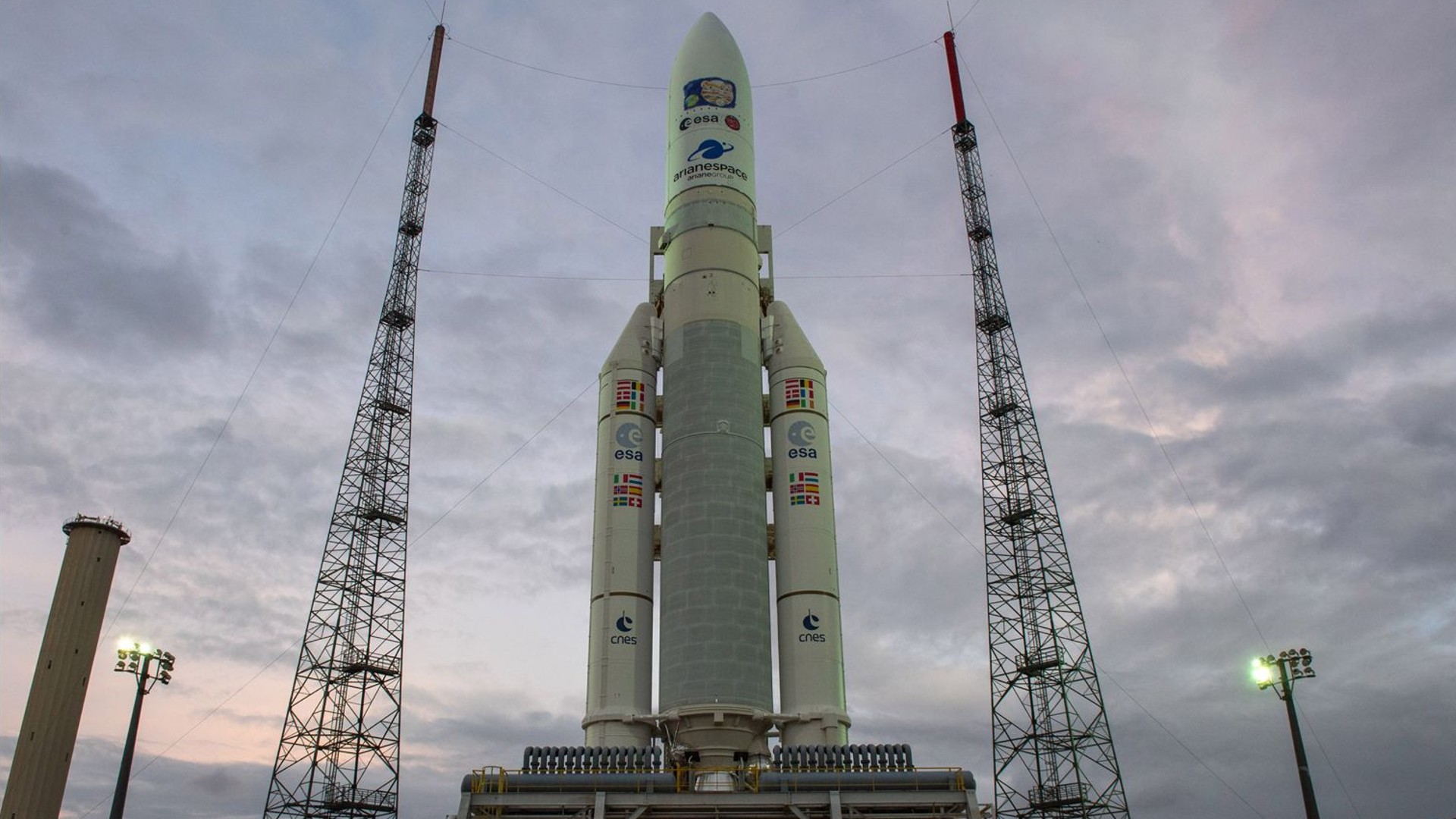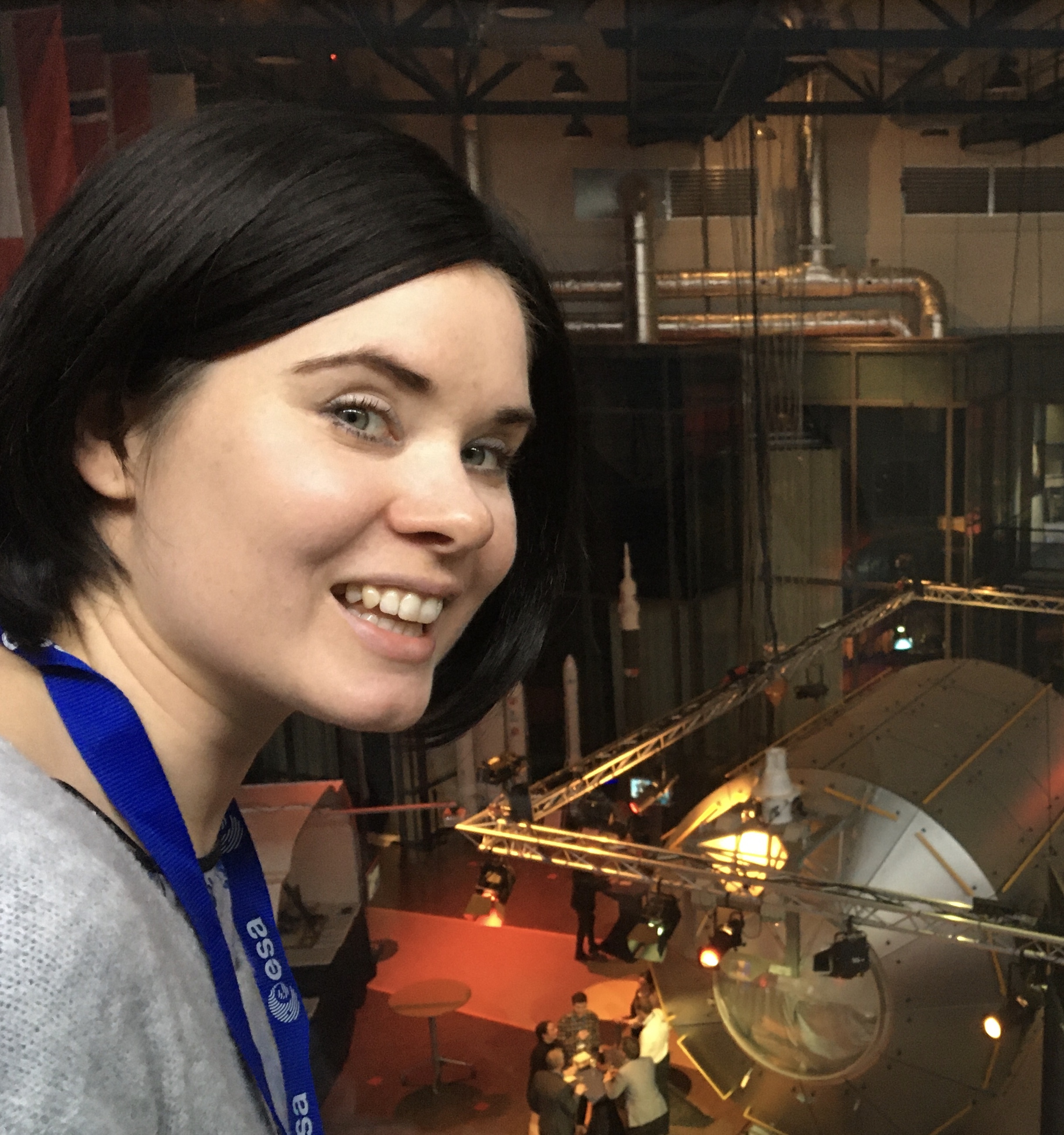Europe's Jupiter explorer JUICE misses one-second launch window because of lightning risk
But don't despair, tomorrow is another day!

Europe's Jupiter explorer will wait at least one day longer for launch.
Europe's JUICE mission missed its first one-second launch window on Thursday (April 13), because of bad weather at the European spaceport in Kourou, French Guiana. The launch provider Arianespace will attempt to launch again on Friday, April 14, at 8:14 a.m. EDT (1214 GMT) and you can watch the attempt live here at Space.com.
Arianespace halted the pre-launch sequence about ten minutes before liftoff, scheduled for 8:15 a.m. EDT (1215 GMT), because of a risk of lightning at the launch site. The company added in a tweet that both the rocket and its passenger, the European Space Agency's (ESA) Jupiter Icy Moons Explorer (JUICE), are in a "safe and stable condition."
"It's part of our business and what is important is that for liftoff, you have to make sure that all the parameters are green," Arianespace CEO Stéphane Israël said in an ESA livestream. "The launcher was okay, JUICE was okay, but the final checks on weather were not okay. You have two weather-related reasons not to lift off — high-altitude winds and the risk of lighting. The high-altitude winds were okay, but there was a risk of lightning."
Related: Europe's Jupiter Icy Moons Explorer is unlikely to find life. Here's why.
The launch of JUICE is somewhat peculiar as the spacecraft needs the rocket to insert it into a very precise orbit around the sun that will swing the mission back to Earth for a unique gravity-assist maneuver next year. This gravity-assist will, for the first time in the history of spaceflight, take advantage of the gravity of Earth and its moon at the same time, to push JUICE on a path toward Jupiter. For this reason, the mission only had a one-second launch window today to get off the ground. But fortunately, another one-second launch window will open Friday and there will be further opportunities every day until the end of this month.
"We will be back tomorrow morning, aiming for a liftoff one minute earlier than today," Israël said.
Get the Space.com Newsletter
Breaking space news, the latest updates on rocket launches, skywatching events and more!
JUICE is Europe's first mission to the Jupiter system, which aims to explore the gas giant planet's three main moons: Ganymede, Callisto and Europa. The spacecraft will take eight years to reach its destination, making additional flybys at Venus and Earth to slingshot itself toward the outer solar system where Jupiter resides.
JUICE's main science target is Jupiter's largest moon Ganymede, the largest moon of the solar system, and if all goes well, the probe will enter orbit directly around Ganymede three years after its arrival at Jupiter. By doing so, JUICE will become the first spacecraft in history to orbit a moon other than Earth's own.
JUICE will blast off into space atop Europe's tried and tested Ariane 5 rocket, which in December 2021 launched the famed James Webb Space Telescope. That launch won praise for Arianespace as it was executed so precisely that the telescope didn't need to use its own fuel to correct its trajectory to reach its destination. Saving fuel during its journey means Webb will be able to operate longer than was originally predicted.
The JUICE launch will be the penultimate liftoff for Ariane 5, which will retire later this year after 30 years of service to be replaced by Europe's new Ariane 6 booster. That launcher is still awaiting its debut launch later this year.
JUICE will orbit Jupiter at the same time as NASA's Europa Clipper mission. Jointly, the two spacecraft will try to find out whether conditions for life might exist on the ice-covered moons of Jupiter, which are believed to harbor vast subsurface oceans of liquid water.
Follow Tereza Pultarova on Twitter @TerezaPultarova. Follow us on Twitter @Spacedotcom and on Facebook.
Join our Space Forums to keep talking space on the latest missions, night sky and more! And if you have a news tip, correction or comment, let us know at: community@space.com.

Tereza is a London-based science and technology journalist, aspiring fiction writer and amateur gymnast. Originally from Prague, the Czech Republic, she spent the first seven years of her career working as a reporter, script-writer and presenter for various TV programmes of the Czech Public Service Television. She later took a career break to pursue further education and added a Master's in Science from the International Space University, France, to her Bachelor's in Journalism and Master's in Cultural Anthropology from Prague's Charles University. She worked as a reporter at the Engineering and Technology magazine, freelanced for a range of publications including Live Science, Space.com, Professional Engineering, Via Satellite and Space News and served as a maternity cover science editor at the European Space Agency.









